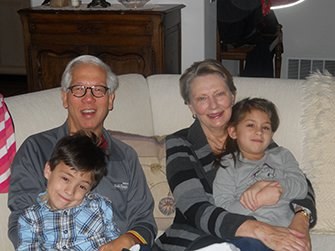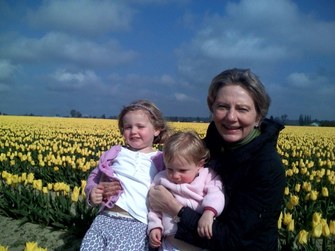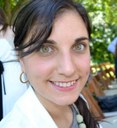A Commitment to PEPS, Grandparents and Community
by Jennifer Fliss
- Jan with her granddaughter Flora

- Jan with her husband Terrill and their grandkids Eric Jr and Vanessa
She believes that the community building that PEPS does is integral for mental health, of both the parents and the children. “I think there’s a tendency for people to be isolated. Even in this busy world and big cities,” she says. “PEPS helps break down the isolation that commonly occurs after having a child. It’s important for community building and mental health, for parents and for the children.”
It is also important for grandparents. As a grandparent of four grandchildren, all in the Seattle area, Jan steps in to fill the role of loving grandmother and regular childcare provider. She watches two sets of grandchildren weekly and is thrilled to be a part of the child-rearing team.
Jan has plenty of experience. She was a parent educator, first in the community college system here in Seattle then later for KIRO News, and still more as a writer for the Seattle Times, Disney, and many other outlets. Her experience is one thing that helps her aid her grandson George, when his bucket of water starts dripping. A bit like MacGyver, the two problem solve with some carefully posed questions and some duct tape. It is her hours alone with the children that are proving to be a real education.
With the costs of childcare becoming more and more exorbitant, many people are going back to an older model. One where grandparents watch their grandchildren on a regular basis. These days, sixty isn’t the same as it was forty years ago. Sixty-year-olds are vibrant, active and want to be more than just a watchful eye on their young charges, but they still have unique challenges. Over the past couple years, Jan has worked with PEPS to create an initiative to engage grandparents. Those grandparents specifically who are an active part of the village. Those who need to reconnect with what it is like to be around young children. Those who want to grow as a role model and support their own children as they become more comfortable being parents.
“Grandparents are a huge source of love, even if they live far away. If a child knows in the back of their mind and deep in their heart, that their grandparents love them. That is a treasure.”
These grandparent PEPS meetings usually occur over wine and some food and delve into issues like how to deal with entitlement in kids these days, how to balance being involved without overstepping boundaries, and how to talk to grandchildren about aging caregivers and the corresponding physical or mental obstacles. Jan facilitates these get-togethers and wants to answer these two questions: what can a grandparent add that is different than the parents and how can a grandparent can support their adult children? There hasn’t been a lot of conversation about this topic. PEPS is helping to answer those questions in a community-based way.
When Jan first got involved with PEPS, she hadn’t envisioned the profound change PEPS would have on the city’s parenting community. These days it is common for mothers wandering the grocery store to see their fellow PEPS group mothers in the produce aisle. Upon meeting new mothers, the first question is frequently, “are you in a PEPS group?” Among many circles, it is a given that the mother or the couple will join a PEPS group.
Unfortunately, while this is widely assumed by many, it isn’t the case everywhere. Jan wishes PEPS could expand, even regionally, where she sees less PEPS representation. “Even in Burien,” where she lives, she sees the gap. What is needed, she says, is “manpower.” Manpower comes from resources, and that’s why generous planning ahead is so beneficial. PEPS isn’t going anywhere. In fact, it is growing. The number of parents in PEPS groups has increased 40% in the last four years. And with the grandparents’ initiative, they are poised to reach even more caregivers.
It’s clear to me as I listen to Jan, even over the phone, that there is real passion for what she hopes for the possibilities at PEPS and why she named PEPS as part of her planned giving arrangements.
About the Author
Jennifer Fliss is a New York raised, Wisconsin and California schooled, Seattle based writer. She holds a B.A. from the University of Wisconsin and a certificate in Literary Fiction from the University of Washington. Her writing has appeared or is forthcoming in numerous publications, including Brain Child, Zelle (Runner’s World), Prime Number, Foliate Oak, Siren Magazine, Silver Birch Press, Blotterature, The Belltown Messenger, Daily Mom, BookerMarks, and The Well Read Fish. More information can be found here: www.jenniferflisscreative.com. Jennifer is also a PEPS alumna and is thrilled to continue her involvement and support.
Document Actions

